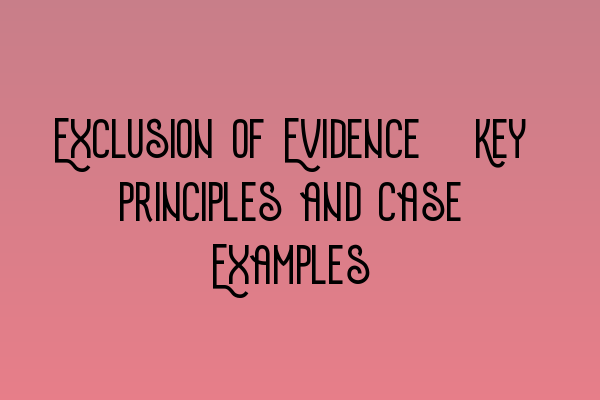Exclusion of Evidence: Key Principles and Case Examples
As criminal law solicitors, we understand the critical role that evidence plays in determining the outcome of a case. It is the foundation upon which our legal arguments are built and the weight it carries can make or break a trial. However, there are circumstances where certain evidence must be excluded due to various legal principles and considerations. In this blog post, we will explore the key principles of excluding evidence and provide you with some relevant case examples to illustrate these principles in action.
Key Principles of Excluding Evidence
1. Relevance: In order for evidence to be admissible in court, it must be relevant to the issues being tried. Evidence that has no probative value, meaning it does not make a fact in dispute more or less likely, may be excluded.
2. Hearsay: Hearsay evidence, which is an out-of-court statement used to prove the truth of the matter asserted, is generally inadmissible. There are exceptions to this rule, such as statements made by a party opponent or dying declarations.
3. Privilege: Certain communications are protected by privilege and cannot be used as evidence. Examples of privileged communications include those between lawyer and client, doctor and patient, or spouses.
4. Illegally Obtained Evidence: Evidence obtained through illegal means, such as unconstitutional searches or coercive interrogations, may be excluded. This is to deter law enforcement misconduct and protect defendants’ rights.
5. Opinion and Character Evidence: Opinions and character evidence are generally not admissible unless they fall within specific exceptions. The focus should be on the facts of the case, rather than the opinions or character of the individuals involved.
Case Examples
Let’s explore some case examples where evidence was excluded based on the aforementioned principles:
- In R v. Smith, the defendant’s confession was excluded as it was obtained through coercive interrogation techniques that violated his right to a fair trial. This is an example of illegally obtained evidence being excluded.
- In R v. Jones, the court excluded the testimony of a witness who made a statement to the police but later recanted. Since the statement was hearsay and the witness was available for cross-examination, it was deemed inadmissible.
- In R v. Johnson, the defendant sought to introduce character evidence of the victim’s violent past. The court ruled that the evidence was irrelevant and could unduly prejudice the jury’s perception of the case.
Understanding the principles of excluding evidence is crucial to effectively argue for or against the admission of certain evidence in court. As criminal law solicitors, we are well-versed in these principles and can provide you with the expertise necessary to navigate complex evidentiary issues.
For further resources on SQE preparation and exam dates, we recommend checking out the following articles:
- SQE 1 Practice Exam Questions
- SQE 1 Practice Mocks FLK1 FLK2
- SQE 2 Preparation Courses
- SQE 1 Preparation Courses
- SRA SQE Exam Dates
We hope this blog post has provided you with valuable insights into the exclusion of evidence in criminal trials. If you require legal assistance or have any questions regarding this topic, please feel free to contact us. We are here to help.
